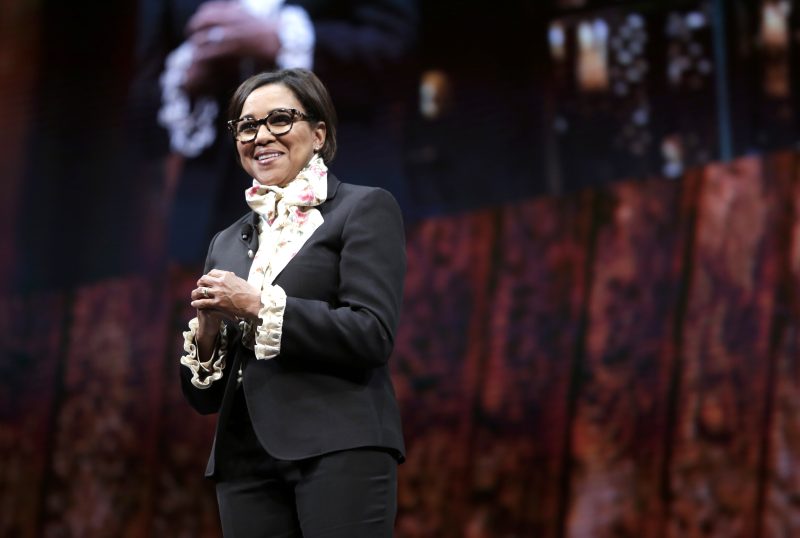
Walgreens CEO Roz Brewer steps down after more than two years in the role
Walgreens Boots Alliance said Friday that Roz Brewer had stepped down as the company’s chief executive.
She also left the company’s board, effective Thursday. The decision was mutual, according to a news release.
Shares of Walgreens were effectively flat in premarket trading.
Ginger Graham, the lead independent director and a healthcare industry veteran, will work as interim chief while the company searches for a replacement. Graham is a veteran of the healthcare industry.
Brewer has agreed to continue advising the company until it selects a permanent CEO. She didn’t immediately return requests for comment.
“Our Board and leadership team will intensify our focus on creating value for our customers and our shareholders while we advance the search for a successor with deep healthcare experience to lead in today’s dynamic environment,” said Stefano Pessina, Walgreens’ executive chairman.
Brewer and Walgreens were in a rough patch leading up to Friday’s announcement. Walgreens shares are down more than 32% this year as of Thursday’s close, as the company has struggled with a drop in demand for Covid testing and vaccines. It’s also seen front-end retail sales for items like toothpaste and shampoo consistently fall as consumers go to competitors like Walmart and Amazon for those everyday necessities, which can be ordered online and delivered within a couple of days.
In June, the company reported fiscal third-quarter earnings that missed Wall Street expectations for the first time since July 2020. It also slashed its profit guidance for the year.
However, Covid cases are back on the rise and could prove to be a boon for pharmacy sales. The next Covid boosters are slated to start rolling out in mid-September.
For consumers who may not be interested in another Covid booster, they could still turn to Walgreens for its typical over-the-counter cold and flu products. During its fiscal first quarter ended Nov. 30, an early cold and flu season boosted demand for cough and cold medicine and helped Walgreens offset its losses from a slowdown in vaccine demand.
A retail veteran in a health care world
A veteran of Walmart and Starbucks, Brewer had led Walgreens since March 2021. During her brief tenure, which included a sizable stretch of the Covid pandemic, the company had pursued a transition that would position Walgreens more as a healthcare company than a pharmacy chain.
Walgreens recently acquired Summit Health and primary-care provider VillageMD, which has opened hundreds of total clinics, including some that are adjacent to Walgreens stores.
It also struck a deal with CareCentrix, which coordinates home care for patients after they’re discharged from the hospital, and Shields Health Solutions, a specialty pharmacy company.
Competitor CVS Health Corp has also been leaning into a healthcare strategy. In February, it announced plans to acquire Oak Street Health Inc for about $9.5 billion in cash so it can add primary care to its portfolio of health offerings. Meanwhile, Rite Aid Corp has focused on expanding its pharmacy presence and is now reportedly preparing a bankruptcy filing.
Yet as Walgreens leans deeper into its aspirations to become a health care provider and away from its identity as a drugstore chain, Brewer’s skillset isn’t as aligned with the company’s goals. Prior to her tenure with Walgreens, she served as Starbucks’ operating chief and group president, and previously ran Walmart’s Sam’s Club as its CEO. She’d spent about a decade with Walmart in a series of executive positions.
“The retail side of the business, where Ms. Brewer has much more experience, is simply not an area that Walgreens wants to pursue as a major growth opportunity,” retail analyst and GlobalData managing director Neil Saunders said in an emailed statement.
“All of this must come as a disappointment to Ms. Brewer, but it also means that a different sort of experience is needed to lead the business. It is notable that the interim CEO, Ginger Graham, has a much deeper background in the healthcare and pharma industries,” he added.
More from CNBC
China says the best way to ‘de-risk’ is to restore stability with the U.S. Hollywood studios should cut Netflix out of strike negotiations, Barry Diller says U.S. health officials want to loosen marijuana restrictions. Here’s what it means for the industry
